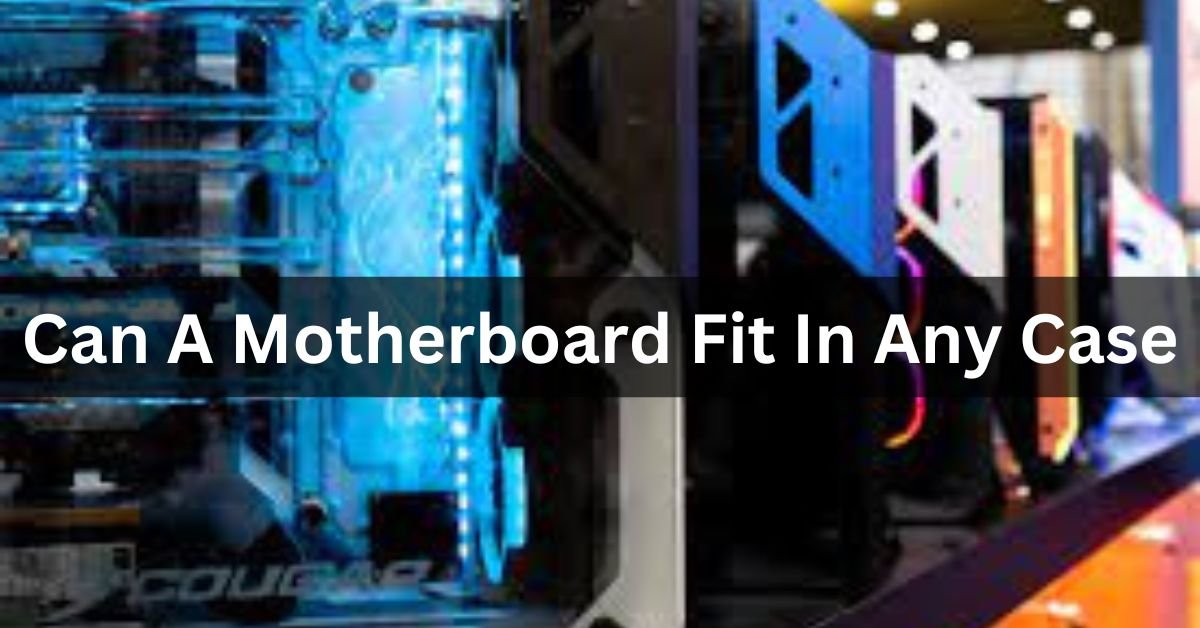In the realm of building or upgrading a PC, one crucial question that often arises is whether a motherboard can fit in any case. The motherboard serves as the foundation of a computer, connecting various components such as the CPU, RAM, storage devices, and peripherals.
No, not all motherboards can fit in any case. Motherboard and case sizes must match, such as ATX, MicroATX, or Mini-ITX, to ensure proper alignment and compatibility.
In this article, we will discuss “Can A Motherboard Fit In Any Case”.
Introduction to Motherboard and Computer Cases:
Before delving into compatibility issues, it’s essential to grasp the fundamental roles of motherboards and computer cases.
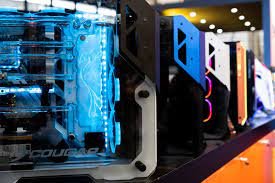
The motherboard serves as the central hub, connecting various components such as the CPU, RAM, and storage devices. On the other hand, the computer case provides structural support, housing the components and facilitating airflow for cooling.
Importance of Compatibility Between Motherboard and Case:
The compatibility between a motherboard and a case is paramount for several reasons.
Firstly, it ensures proper alignment of mounting points and connectors, facilitating easy installation and maintenance.
Secondly, it promotes efficient airflow and temperature management, crucial for system stability and longevity.
Read: Msi Motherboard Error Codes – Comprehensive Guide of 2024!
Standard Motherboard Form Factors:
Motherboards come in various form factors, with the most common being ATX, Micro-ATX, and Mini-ITX. Each form factor dictates the motherboard’s dimensions and layout, influencing its compatibility with different cases.
Standard Computer Case Sizes:
Likewise, computer cases are available in different sizes, including full-tower, mid-tower, and mini-tower configurations.
These sizes accommodate varying motherboard form factors and offer different levels of expansion and customization.
Read: Do All GPU Fit All Motherboards – Comprehensive Guide – 2024
Factors Affecting Motherboard Fit in a Case:
The compatibility between a motherboard and case hinges on several factors, including the motherboard’s form factor and physical dimensions.
While some cases may accommodate multiple form factors, others are tailored to specific sizes, limiting compatibility options.
Case and Motherboard Compatibility:
Ensuring compatibility between a motherboard and case involves meticulous consideration of both components’ specifications.
While standardization efforts have streamlined compatibility across mainstream configurations, custom or specialized cases may pose unique challenges.
Read: Can I Use 1866mhz Ram On 1600 Motherboard – Ultimate Guide
How to Determine if a Motherboard Fits in a Case?
To determine if a motherboard fits in a case, one must cross-reference the motherboard’s form factor with the case’s compatibility specifications.
Additionally, measuring physical dimensions and assessing clearance for components such as CPU coolers and graphics cards is crucial.
Read: New Motherboard Ethernet Not Working – Ultimate Guide – 2024
Tips for Ensuring Compatibility:
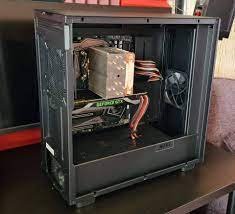
Researching and comparing specifications, consulting manufacturer guidelines, and seeking community feedback are effective strategies for ensuring compatibility.
Additionally, considering future upgrade paths and expansion options can preempt compatibility issues.
Modifications and Adaptations:
In some cases, modifications or adaptations may be necessary to facilitate motherboard and case compatibility.
This could involve customizing mounting points, rearranging internal components, or investing in aftermarket accessories.
Read: Do Motherboards Come With Thermal Paste – Complete Guide!
Risks of Mismatched Motherboard and Case:
Mismatched motherboard and case combinations can lead to various issues, including poor airflow, restricted access to ports and connectors, and compromised structural integrity.
In extreme cases, compatibility issues may necessitate component replacements or system reconfiguration.
PC Case Compatibility Checker.
A PC case compatibility checker is a tool or guide that helps you confirm whether your chosen components, like the motherboard and graphics card, will fit and work properly within a specific PC case.
Will Any PC Casework.
No, not every PC case will work. You need to check compatibility based on your motherboard’s form factor, graphics card size, and other components. Ensure the case has enough space and mounting points for your hardware before purchasing.
Micro Atx Motherboard.
A Micro ATX motherboard, also known as mATX, is a smaller form factor motherboard designed to fit into cases that support the Micro ATX form factor. It offers a balance between size and features compared to larger ATX motherboards.
Can any motherboard fit into any case?
No, not every motherboard can fit into every case. You need to check compatibility by matching the motherboard’s form factor (like ATX, Micro-ATX, Mini-ITX) with the case’s supported sizes. Always verify compatibility before assembling your PC.
How to know if a PC case will fit?
To ensure a PC case will fit, check its compatibility with your motherboard’s form factor, GPU length, CPU cooler height, and drive bays. Compare these specifications with those of your components to ensure a proper fit.
How to tell what size your PC case is?
To determine the size of your PC case, you can measure its dimensions using a tape measure or refer to the product specifications provided by the manufacturer. Look for details such as height, width, and depth to identify the case size accurately.
What size is my motherboard?
To determine the size of your motherboard, you can refer to its form factor. Common form factors include ATX, Micro-ATX, and Mini-ITX. Check the specifications of your motherboard or consult its documentation to find its specific size.
How to Find Out Which Form Factor Your PC Case Supports?
To determine which form factor your PC case supports, check the case specifications provided by the manufacturer. Look for information on supported motherboard sizes such as ATX, Micro-ATX, or Mini-ITX.
How do I know if a motherboard will fit in my case?
To know if a motherboard will fit in your case, check its form factor (like ATX, Micro-ATX, Mini-ITX) and compare it with the case specifications. Ensure the case has mounting points and enough space for the motherboard’s dimensions.
Are motherboards one size fits all?
No, motherboards are not one size fits all. They come in different sizes and form factors such as ATX, Micro-ATX, and Mini-ITX. It’s important to choose a motherboard that matches your case and other components.
How do you tell if your PC parts will fit in the case?
To ensure your PC parts fit in the case, check their specifications against the case’s compatibility. Look for details like motherboard size, GPU length, CPU cooler height, and drive bays to confirm they match your case’s dimensions.
What if my motherboard doesn’t fit in my case?
If your motherboard doesn’t fit in your case, you may need to either get a larger case or a motherboard that matches the size requirements of your case. Double-check compatibility and consider your options for a proper fit.
Motherboard Case Compatibility Checker.
A motherboard case compatibility checker helps you ensure that your motherboard fits properly into your chosen computer case. It verifies dimensions, mounting points, and connector placements to ensure a seamless fit for your components.
Can Any Motherboard Fit Any Graphics Card?
No, not every motherboard fits every graphics card. You need to check compatibility. Some graphics cards require specific slots and power connections that may not be available on all motherboards. Always verify compatibility before purchasing.
Is the motherboard compatible with the case?
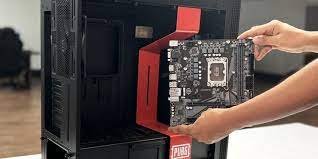
Yes, the motherboard fits in the case. They work together without problems. The parts fit nicely, so you can assemble your computer without worrying about compatibility issues between the motherboard and the case.
Will my proprietary Motherboard fit in a standard ATX case?
Yes, if your motherboard follows the ATX standard, it should fit in a standard ATX case. Make sure to check the specifications of both your motherboard and the case to ensure compatibility.
Can i put a Micro ATX board in a ATX case if so how?
Yes, you can put a Micro ATX board in an ATX case. Simply align the screw holes on the motherboard with the standoffs in the case. Secure the motherboard with screws provided. Make sure all ports align with the case cutouts.
Will prebuilt motherboard fit into aftermarket case?
Yes, a prebuilt motherboard can fit into an aftermarket case as long as the case supports the size and form factor of the motherboard. Check the specifications of both the motherboard and the case to ensure compatibility before installation.
Will any motherboard fit in any case or do I have to go out of my way to make sure that my case will properly house a specific motherboard?
No, not every motherboard fits every case. You need to make sure the case matches the motherboard size, like ATX or microATX. Check the case specifications to see which motherboard sizes it supports before buying.
How to make sure a new motherboard will fit your PC?
To ensure a new motherboard fits your PC, check its form factor compatibility with your case. Measure dimensions, especially the motherboard tray, to confirm fit. Also, verify that the case has the necessary screw holes and cutouts for ports and connectors.
Computer rebuild. Will My motherboard fit into any case?
When rebuilding a computer, it’s important to check if your motherboard fits into any case. Usually, newer motherboards can fit into older cases, but make sure to match the motherboard’s form factor with the case’s compatibility.
Do newer motherboards tend to be compatible with older cases?
Yes, usually newer motherboards are designed to fit in older cases. But sometimes, you might need to check compatibility with the case’s form factor and connector types.
Read: Do Motherboards Come With Windows – Ultimate Guide – 2024
Can an AT case accept an ATX motherboard?
Yes, an AT case can accept an ATX motherboard if it is specifically designed to accommodate the larger form factor. However, it’s essential to check the case’s specifications to ensure compatibility and proper mounting of the ATX motherboard.
What is the difference between ATX and BTX motherboard types?
ATX and BTX are different motherboard types. ATX has components like CPU and memory on one side, while BTX has them on the opposite side. BTX aims to improve airflow and cooling efficiency compared to ATX, but it’s less common.
Read: What Does Cha Fan Mean On Motherboard – Complete Guide!
How do I know what size motherboard to buy?
To choose the right size motherboard, consider your case size and intended usage. Common sizes include ATX for full-sized builds, MicroATX for smaller setups, and Mini-ITX for compact systems. Ensure compatibility with your case and desired components before purchasing.
Read: Can Power Supply Damage Motherboard – Ultimate Guide – 2024
How do I know what size (form factor) motherboard I have?
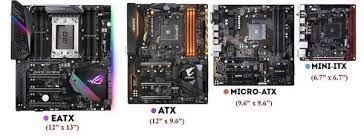
To determine your motherboard’s size or form factor, check its documentation or visit the manufacturer’s website. Common sizes include ATX, MicroATX, and Mini-ITX. You can also physically measure the motherboard or refer to the specifications provided by the manufacturer.
Can a motherboard fit in any case for gaming?
Yes, most gaming motherboards can fit into any gaming case. But it’s important to check the motherboard and case sizes to ensure compatibility. It’s like making sure puzzle pieces fit together before starting to play.
Is every case compatible with every motherboard?
Not every case is compatible with every motherboard. Cases and motherboards come in different sizes and configurations, so it’s important to match them correctly. Checking the case and motherboard specifications ensures compatibility and a proper fit.
Can we fit any motherboard in any cabinet?
Not every motherboard can fit into any cabinet. Motherboards come in different sizes, such as ATX or microATX, and you need to match that to the cabinet’s specifications. Checking compatibility beforehand ensures a proper fit.
Can every motherboard fit to any PC cases?
Not every motherboard can fit into any PC case. Motherboards come in different sizes, like ATX or microATX, and you must match the motherboard’s size to the case’s specifications. Checking compatibility beforehand ensures a proper fit.
Can any case fit any parts?
Not every case can fit any parts. Cases have size limits and specific configurations for components like motherboards, graphics cards, and power supplies. Check the case specifications to ensure compatibility with the parts you want to install.
Do all motherboards fit in any case?
Not all motherboards fit in any case. Different motherboards come in different sizes, like ATX or microATX, and you must match the motherboard’s size to the case’s specifications. Checking compatibility before purchasing is essential to ensure a proper fit.
Can all motherboards fit in all cases?
Not all motherboards fit in all cases. Motherboards come in different sizes, such as ATX or microATX, and you need to match that to the case’s specifications. Always check compatibility to ensure the motherboard fits properly in the case.
Can you put any motherboard in any case?
You can’t put any motherboard in any case. They come in different sizes, like ATX or microATX. Make sure to match the motherboard’s size to the case’s specifications. Checking compatibility before buying ensures a proper fit.
Does any motherboard fit in any case?
Not every motherboard fits every case. They come in different sizes, such as ATX or microATX. You must match the motherboard’s size to the case’s specifications. Always check compatibility before buying to ensure a proper fit.
How to know if a motherboard will fit in case?
To check if a motherboard fits a case, look for its form factor (like ATX, microATX) and compare it to the case’s specifications. Also, ensure there’s enough space for ports and components. Check the case manual or website for compatibility information.
Do all motherboards fit all cases?
Not all motherboards fit all cases. Different motherboards come in different sizes, like ATX or microATX, and you need to match that to your case’s specifications.
Are motherboards universal for cases?
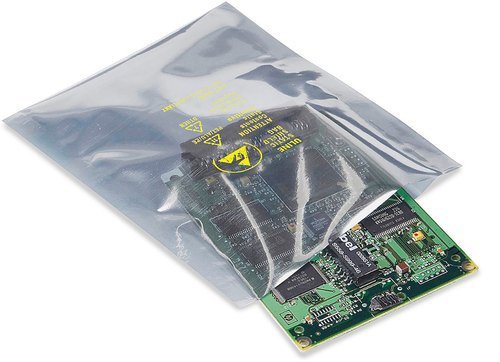
No, Motherboards aren’t universal for cases. You need to match the motherboard’s size, like ATX or microATX, to your case’s specifications. Not all motherboards fit all cases.
Read: Tuf Gaming Motherboard Wifi Not Working – Ultimate Guide!
FAQs:
1. How do I know if my motherboard will fit my PC case design?
To know if your motherboard fits your PC case, check the motherboard’s size (like ATX, MicroATX) and the case specifications. Ensure the case supports the motherboard’s size and form factor.
2. Will any computer case work with new motherboards, CPUs, RAM, etc.?
Yes, many computer cases can fit new motherboards, CPUs, RAM, and other parts. But it’s important to check the case’s specifications to make sure it’s compatible with the components you want to use.
3. Can I use any graphics card with any motherboard?
Yes, you can usually use most graphics cards with most motherboards. Just check if the motherboard has the right slot, like PCIe, for the graphics card you want to use.
4. Are all PC cases universal for all types of motherboards?
No, not all PC cases are universal for all types of motherboards. Different cases support specific motherboard form factors like ATX, Micro-ATX, or Mini-ITX. Compatibility depends on the case’s design.
5. Can we fit sff motherboard into ATX case?
No, typically you can’t fit a Small Form Factor (SFF) motherboard into an ATX case. SFF motherboards are smaller and designed for compact cases, while ATX cases are larger and accommodate standard ATX motherboards.
6. What are the compatibility requirements for a PC motherboard and case? Will a motherboard work properly in any case?
To ensure compatibility, match the motherboard’s form factor (e.g., ATX, Micro-ATX) to the case. Also, check for clearance and alignment of ports. Not all motherboards fit in any case due to size differences.
7. Is it possible to rebuild a new computer with the latest parts in my very old PC case?
Yes, it’s possible to rebuild a new computer with the latest parts in your very old PC case, as long as the new components fit and the case provides adequate ventilation and space.
8. Can you put an ATX PSU into a micro ATX case and motherboard?
Yes, you can put an ATX PSU into a micro ATX case and motherboard as long as the case has enough space to accommodate the larger PSU. Compatibility should be checked beforehand.
9. Will a HP Com 8300 CMT motherboard fit in an ATX case?
Yes, the HP Com 8300 CMT motherboard will fit in an ATX case. Both the motherboard and ATX case follow standard sizes, ensuring compatibility between the two components.
10. What case will fit in this motherboard and PSU?
To find a case for your motherboard and PSU, make sure to check their sizes and compatibility. Look for a case that matches the motherboard’s form factor and has room for your PSU.
11. Will my motherboard fit my case?
To check if your motherboard fits your case, look at the motherboard’s form factor (like ATX, microATX) and compare it to your case’s specifications. They need to match.
Conclusion:
In conclusion, ensuring your motherboard fits your case is crucial for a smooth PC build. Compatibility depends on matching form factors and considering dimensions. Always verify specifications and use compatibility checkers. Remember, not all cases fit all motherboards, so research and measurement are key before assembling your PC.
